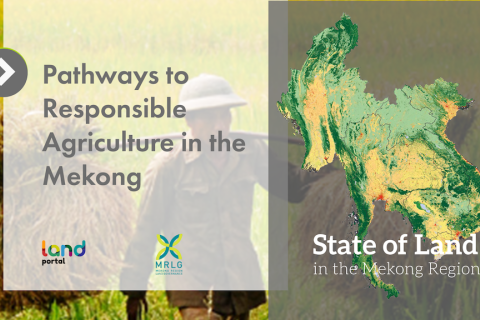On January 23, 2025, the Land Portal Foundation and Mekong Region Land Governance (MRLG) convened a webinar to explore the evolving landscape of agricultural investments in the Mekong region. Experts from various sectors joined to discuss the impact of industrial crops, smallholder farmer integration into transnational value chains, and the resulting economic, environmental, and social transformations. Through insightful presentations and discussions, the session highlighted the governance challenges these shifts pose and examined initiatives promoting responsible agricultural investment.
Understanding the Agricultural Transition in the Mekong
Jean-Christophe Diepart, researcher at the School for Field Studies in Siem Reap, opened the session with an overview of agricultural development in the Mekong, drawing from a recent study on agricultural investments. He emphasized that agricultural intensification and expansion are major drivers of deforestation, particularly in Cambodia, Laos, and Myanmar. "While large-scale land concessions have been scrutinized for their role in deforestation, smallholder-driven agricultural expansion is an equally significant force," he noted. The push towards commercial agriculture, often through contract farming, has increased production and exports but has also deepened inequalities among farmers.
He highlighted that contract farming, when implemented correctly, can enhance market access for smallholder farmers. However, poorly structured contracts can lead to exploitative conditions, land insecurity, and environmental degradation. "Governments need to play a proactive role in creating an enabling environment for fair contracts," Diepart stressed.
The Role of Geospatial Data in Responsible Investment
Fred Stolle, Director of Impact at the Land & Carbon Lab, World Resources Institute, introduced new geospatial monitoring tools that track land use changes. "The advances in AI and remote sensing provide us with near real-time data on deforestation, cropland expansion, and emissions," Stolle explained. He presented maps illustrating forest loss trends in the Mekong region, showing the stark contrast between countries: while Vietnam has successfully reduced deforestation, Laos and Myanmar have seen continued agricultural expansion into forested areas.
He underscored the importance of using such data to inform policies. "Transparent data can empower communities, researchers, and policymakers to make informed decisions and hold investors accountable," he said.
Ground-Level Perspectives on Contract Farming and Land Rights
Soytavanh Mienmany, an independent researcher from Laos, offered a nuanced view of contract farming through the lens of efficiency, equity, and justice. She shared a case study of sugarcane farming in Savannakhet Province, where government-controlled land was leased to private companies and then subleased to farmers at exorbitant rates. "The original lease was $6 per hectare per year, but farmers ended up paying $50 to $80 per hectare," she revealed. This arrangement left farmers with little choice but to engage in contract farming under unfavorable terms.
She also highlighted gender disparities in contract farming, particularly in banana plantations, where women faced greater obstacles in securing fair contracts. "Government intervention in negotiations helped some farmers secure better prices, but power imbalances remain a significant challenge," she concluded.
Sothath Ngo, Research Manager at the Center for Policy Studies in Cambodia, echoed similar concerns. He described how contract farming in Mondulkiri Province was initially presented as a solution to land conflicts but ultimately exacerbated land loss. "Farmers had to give up half their land to participate, and when rubber prices collapsed, they were left vulnerable, unable to repay debts," he explained. He stressed the need for legal safeguards to prevent exploitative contracts and ensure that farmers retain agency over their land.
The Role of Land Rights and Cooperatives in Empowering Farmers
Nikka Rivera, Agenda Coordinator for Land Rights and Young Farmers at the Asian Farmers’ Association (AFA), emphasized the critical role of secure land tenure. "Land is more than just an economic commodity; it's tied to food security, culture, and identity," she said. Rivera pointed out that without tenure security, farmers are at greater risk of land grabbing, displacement, and loss of access to resources. She advocated for stronger farmer cooperatives, which can enhance collective bargaining power, facilitate access to financial support, and ensure fairer contracts.
"When farmers are organized, they can negotiate better deals. In Laos, for example, FASAP secured an export partnership for Roselle tea because they had good governance structures in place," Rivera highlighted.
Moving Towards More Responsible Agricultural Investments
The discussions underscored the necessity of multi-stakeholder approaches to ensure responsible investment. Soytavanh Mienmany recommended clear, simplified, and notarized contracts that farmers can easily understand. Sothath Ngo called for stronger legal protections to prevent land loss and ensure equitable contract terms. Jean-Christophe Diepart and Fred Stolle stressed the need for accessible data to empower communities and decision-makers.
Additionally, Naomi Basik Treanor, the webinar moderator, noted that the Lao government’s ongoing work on a Prime Ministerial Decree on contract farming could be a step in the right direction, provided it includes strong safeguards. "It’s not just about improving contracts—it’s about ensuring that farmers have the knowledge, resources, and bargaining power to engage in them on fair terms," she concluded.
As agricultural transitions continue reshaping the Mekong region, a balanced approach that prioritizes land rights, environmental sustainability, and economic justice will be crucial in achieving responsible agricultural investment. The webinar provided a platform to highlight both the challenges and opportunities, offering a roadmap for future action in the region and beyond.





